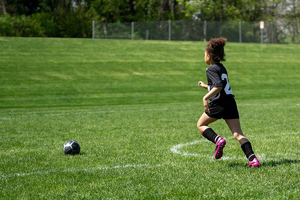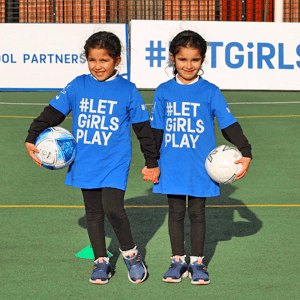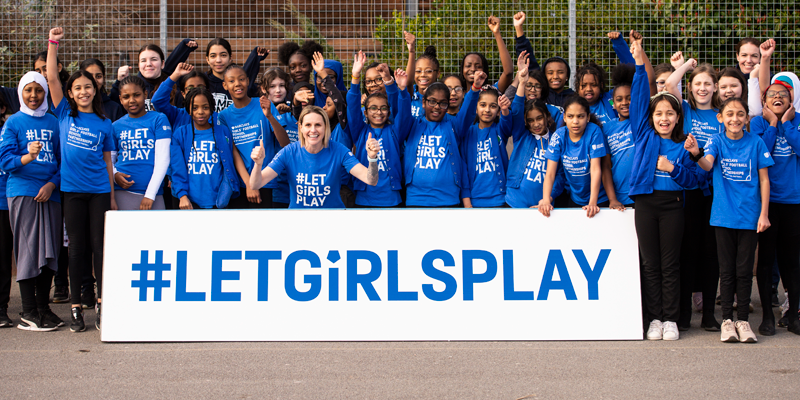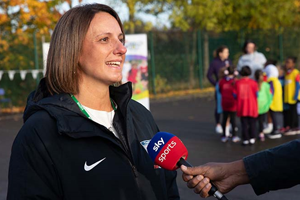Louise is Head of Development at The Football Association, having joined the organisation in November 2017. Prior to taking up her role at The FA, Louise served the Youth Sport Trust charity for 17 years, where she oversaw the work of multiple teams. She is now pioneering the women’s and girls’ grassroots strategy at The FA, with a vision to transform the game for girls, in schools and clubs by 2024.

“Shortly after being crowned champions in the Women’s Euros, the England Senior Women’s team sent an open letter to UK Government, requesting a minimum of two hours PE for girls in schools. We’d love your community to get behind our Lionesses’ request.”
On the ball
By way of education, I attended secondary school and did my GCSEs, before going to sixth form college where I studied for a diploma in sports management and hospitality. I got my first job as a marketing assistant in a leisure centre and I made the decision not to go to university because I was playing international netball at the time, training hard, and I couldn’t really afford to go to into further education because I didn’t have the time to work to pay for it. I can honestly say I’ve never regretted my decision though.
Before I came to The FA, I was an assistant director of networks for a charity that uses sport to change young people’s lives, the Youth Sport Trust. I was there for 18 years and then came to The Football Association five years ago now. (Wow, that’s gone fast..!)
Day to day at The FA
The purpose of the team that I run at The FA is to grow and future-proof the national grassroots game of football across England. What I do with my team is look at how we can develop new and different opportunities for young people and adults to play the game. Overall it’s quite a complex role, but it’s fantastic to know you are providing opportunities for people to play the game we all love.
In the past few weeks I was at the UEFA (Union of European Football Associations) grassroots football conference as a facilitator for them, helping to run their workshops. But the main reason for me being there was to deliver a keynote presentation on the impact of the UEFA Women’s EURO 2022 tournament on grassroots football. It’s quite usual for me to deliver presentations on a weekly basis, hopefully to inspire people.
Meeting with stakeholders can be anything from being interviewed by journalists, to discussions with commercial partners, through to talking with head teachers in schools or agencies that work directly with schools. I also have numerous meetings with different government departments and I do my best to influence government policy, as well as engaging and collaborating with other sports as well.
The rise and rise of the women’s game
The uniqueness of our team working on women’s football at The FA is because we’re exceptionally joined up and we all work really closely together. There is a very strong connection between the elite part of the pathway and my area grassroots, as well as the professional game. (So, our player-facing functions are: the professional game; the elite game (The Lionesses); and then myself with oversight of grassroots football.)
We have a very joined-up, seamless pathway. To give you a practical example of that, once our Lionesses won in the summer, we made sure that you heard from them quite quickly that they wanted to improve the provision in grassroots football and made it very clear that we wanted girls to have more access to physical education and, as importantly, football in schools.
The other point that’s been important on our journey is that I work closely with all those who are in charge of promoting the game and inspiring girls to want to play, so the marketing and communications team helps create the demand and then my role is to make sure there’s the supply of opportunities.
Inspiring Positive Change
The difference in the game hasn’t just happened overnight. There have been people at The FA working tirelessly for many years, pushing the women’s and girls’ game. However in 2020 we launched our Women’s and Girls’ strategy – Inspiring Positive Change – which enabled us to set clear, strategic targets and ambitions for the different areas in the game. We genuinely mean that we want to inspire positive change, and although we have a very powerful brand (which is ‘football’), we also know that if we can achieve the heights that we’ve set out for football in the strategy, then we can actually make a real difference to the lives of women and girls within wider society as well.
Since the England Senior Women’s team won in the UEFA Women’s EUROS it’s been a bit surreal. There’s clearly more profile, and more interest, but also more people who haven’t quite understood just how underrepresented the game is. By that, I mean how few opportunities have been available for girls to play in schools and in clubs. I’ve spoken with many people leading up to the final and post the final, to remind them that we have a long-term plan and goals and it’s important to use the momentum from the England Senior Women’s success to continue to make strides in these areas.

We are at the midpoint in delivering that strategy and, so far, most things are going to plan, but I don’t think we can ignore the fact that the pandemic had quite an impact on schools, and therefore the provision in schools.
What we would like to push in the next year is greater extracurricular provision in primary schools. We know that primary-age school girls are able to access football in their PE lessons or develop their football schools in their PE lessons in curriculum time but that’s not translating into lunchtime and after-school opportunities for girls.
So, their interest could be sparked in their PE lesson, but the figure is as low as 40% of primary schools nationally that are able to offer the same lunchtime and after-school sessions as they do for boys. That’s something in primary schools that we really want to change. We’ve got some fabulous programmes, including Disney Shooting Stars, which is girls-only and helps to get girls physically active on the playground and works on their fundamental movement skills, using the inspiration from some of the popular Disney movies, like Frozen, The Incredibles and Aladdin. Then they move into an after-school football club from there.
We’d like to make a plea to everybody out there from parents of girls, relatives of girls, through to the girls themselves to ask their schools if they can have more lunchtime and after-school opportunities.
In secondary schools where the girls are that little bit older, we need them to be asking their PE teachers to give them a whole term of football. We’ve got training programmes teachers can draw on if they aren’t confident or they don’t feel that they’ve got the right skills to teach football.
Another big challenge is that the time for PE on the curriculum in schools is diminishing, and we don’t want to ‘compete’ with other sports. We just think girls should have access to all of the major team sports.
Support from the Womanthology community
Shortly after being crowned champions in the UEFA Women’s EUROS, the England Senior Women’s team sent an open letter to UK Government, requesting a minimum of two hours PE for girls in schools. We’d love your community to get behind our Lionesses’ request.
More widely though, I’d like for girls to encourage their mums and family members to put themselves forward to become volunteers or coaches. It’s really important that we have more female role models in coaching roles in the game, and also volunteering roles.
We also want to see more women involved in club administration and coaching. There’s a real family feel to the women’s game. We want access and opportunities for girls, but we need to make sure we’ve got the workforce and the people to run this provision across the country. So, anything that girls or women in your community can do to promote volunteering and coaching opportunities to women would be much appreciated.
To mums and aunts and everyone, you don’t have to be a technical expert in football, certainly not when you’re coaching the younger age groups. These girls just want to have a ball at their feet and feel part of something, something special that was created this summer when the England Senior Women’s team lifted that trophy in front of the whole country.
Sometimes with this whole agenda, we could get lost because there’s so much for us to do, but my biggest ask would be to our grassroots clubs out there to be open-minded and welcoming to women and girls, and to make sure that their clubs are female-friendly environments.
The demand to play football from girls is rising on a weekly basis, and the more successful our national team is, the more interest there is to play. We need to make sure we have the supply of clubs in the communities to welcome these girls, who need to feel welcome and feel a sense of belonging in a club environment. It would be great if we could pledge to make all of our clubs family hubs. If you’ve got the whole family involved in the clubs, with girls and boys, sons and daughters playing, and they can play girls only, or they can play mixed.
Coming up

In March 2023 we have our Let Girls Play Biggest Ever Football session in schools, whereby schools around the country host a girls’ football session on the same day. Earlier this year, we had over 90,000 girls competing all on the same day in their lessons at school. That’s a sold-out Wembley Stadium!
In two weeks’ time, we’ve got our Barclays girls football school partnership conference where we’ll have over 300 people working in schools across England who are champions for girls’ football. We’re bringing them all together with our partner, Barclays, to celebrate success. There’s an awards ceremony in the evening too which will be great to celebrate those who are working tirelessly to support our ambition.
On a personal level. I’m looking forward to having a break. My daughter is a tennis player. She’s 15, plays county-level tennis and she’s got a few tournaments coming up so I’m really excited about going to watch her, although it’s very nerve-wracking. I’ll also be having some time watching my son, who’s a rugby player. He plays in an academy for rugby, which is always nail-biting for me too.
I’m looking forward to some time with them after what’s been an incredibly busy summer. In my job the main work started after we won because everybody wants to have the opportunity to play and wants to know where those opportunities are, but I wouldn’t have it any other way.
We really appreciate the support from your Womanthology community though as we can’t do it on our own. It is just like a big oil tanker we’re trying to move here, so any help we’ve got to push it and move it around is always welcome. It’s an important journey that we’re on and it’s going to keep taking time. We’re chipping away, but there are still some lingering perceptions out there that football is more the boys and men, although the tide is turning.






